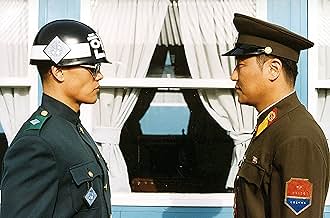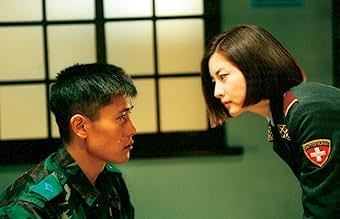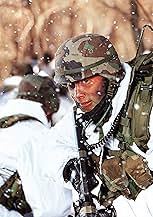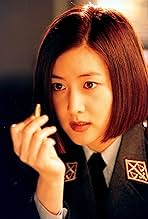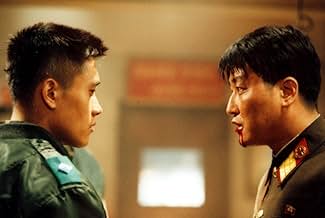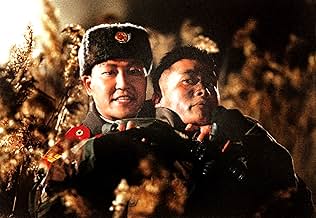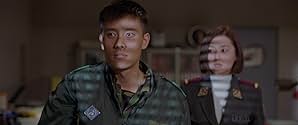AVALIAÇÃO DA IMDb
7,7/10
37 mil
SUA AVALIAÇÃO
Na fronteira que separa a Coréia do Norte da do Sul, dois soldados da Coréia do Norte foram mortos, supostamente por um do Sul. A investigação da equipe sueca da fronteira suspeita que outra... Ler tudoNa fronteira que separa a Coréia do Norte da do Sul, dois soldados da Coréia do Norte foram mortos, supostamente por um do Sul. A investigação da equipe sueca da fronteira suspeita que outra parte desconhecida possa estar envolvida.Na fronteira que separa a Coréia do Norte da do Sul, dois soldados da Coréia do Norte foram mortos, supostamente por um do Sul. A investigação da equipe sueca da fronteira suspeita que outra parte desconhecida possa estar envolvida.
- Direção
- Roteiristas
- Artistas
- Prêmios
- 20 vitórias e 16 indicações no total
Naeem Ghefari
- Jzzj
- (as Naeem Ghafari)
Avaliações em destaque
Chan-wook Park's most politically-charged film tackles the very volatile tension that exists between the North and South Koreans. This could have easily been propagandistic in nature, with this South Korean film portraying the Northerners as mere caricatures of Communistic ideals, but instead the film happily sidesteps this and portrays both the North Koreans and South Koreans as kinsmen.
In the beginning of the picture, both sides have a skewed view of one another, seeing each through the lens of their political temperament - the border between the two thus is interpreted as a wall that filters and jades each one's perspective. However, once that that wall is finally crossed, the two sides realize that no wall really exists, and they begin to see each other as human beings - The soldiers first call one another "enemies", but soon they are calling one another "brothers".
The characters are richly drawn and dynamic to reflect this - each are humans, with their own unique demeanor, and that their national identity is nothing more than a facade. While the soldiers are alone, away from their government infrastructures, both sides cling to one another in fellowship as they find themselves all the same. Only when the absent governmental element is reintroduced are the soldiers forced to revert back behind their facades, and tragedy results.
A powerfully moving and keenly intelligent analysis of the confusing political situation between the two opposing governmental systems. Despite being slightly marred by a few lapses into melodrama and overstatement, that can not take away from its piercing effectiveness.
The highest recommendation possible.
In the beginning of the picture, both sides have a skewed view of one another, seeing each through the lens of their political temperament - the border between the two thus is interpreted as a wall that filters and jades each one's perspective. However, once that that wall is finally crossed, the two sides realize that no wall really exists, and they begin to see each other as human beings - The soldiers first call one another "enemies", but soon they are calling one another "brothers".
The characters are richly drawn and dynamic to reflect this - each are humans, with their own unique demeanor, and that their national identity is nothing more than a facade. While the soldiers are alone, away from their government infrastructures, both sides cling to one another in fellowship as they find themselves all the same. Only when the absent governmental element is reintroduced are the soldiers forced to revert back behind their facades, and tragedy results.
A powerfully moving and keenly intelligent analysis of the confusing political situation between the two opposing governmental systems. Despite being slightly marred by a few lapses into melodrama and overstatement, that can not take away from its piercing effectiveness.
The highest recommendation possible.
Fusing a Hollywood-style 'who-dunnit' with an intellectually poignant essay on Korean geopolitics, 'Joint Security Area' ('JSA') offered a surprisingly moving twist to an otherwise engaging film.
It raises questions on the incredulity of ideological differences. It showcased the ridiculous, yet tragic consequences such an imposed barrier can have on its people. People, whom if not separated by mere political allegiance, have more in common than they care to admit. 'JSA' perceptively explored a modern day Korean psyche - that heartfelt desire for kinship and unity between the people of both Koreas.
'Joint Security Area' is a timely film with a universal message - "Let not differences in race, religion or ideological allegiance blindside our judgement, especially in these violent and confusing times."
I instinctively respond to this message. I hope you do as well.
It raises questions on the incredulity of ideological differences. It showcased the ridiculous, yet tragic consequences such an imposed barrier can have on its people. People, whom if not separated by mere political allegiance, have more in common than they care to admit. 'JSA' perceptively explored a modern day Korean psyche - that heartfelt desire for kinship and unity between the people of both Koreas.
'Joint Security Area' is a timely film with a universal message - "Let not differences in race, religion or ideological allegiance blindside our judgement, especially in these violent and confusing times."
I instinctively respond to this message. I hope you do as well.
After a shootout at the common security area at the border of the two Koreas, when two soldiers were murdered, Maj. Sophie E. Jean (Yeong-ae Lee) is assigned by the Neutral Nations Supervisory Commission to investigate the incident. The smart Major finds lack of consistency in the statements of the survivors, and in spite of being pressed by her superior, she interviews South Koreans Sgt. Lee Soo-hyeok (Byung-hun Lee) and private Nam Sung-shik (Tae-woo Kim), and the North Korean Sgt. Oh Kyeong-pil (Kang-ho Song), disclosing a tragic story of friendship. In the end, peace and Sgt. Oh are preserved hiding the truth in her report.
"Gongdong Gyeongbi Guyeok JSA" is a magnificent and touching antiwar movie. Directed by Chan-wook Park, the director of the cult "Oldboy", only now this film was released in Brazil, after the success of "Oldboy". This movie has a fantastic screenplay that keeps the interest in the impressive story until the very last scene. I was moved with the sad story of friendship between brothers in this polemic theme. The Common Security Area, created on 27 July 1953 with the armistice between the two Koreas after three years of war, and their reunification, seem to be a taboo for these peoples and I appreciate the courage of this group of excellent actors and actress in approaching such theme. In the Extras of the DVD, the cast and director give interviews about the story but never give their opinion about the reunification of these nations. The stunning cinematography and camera work are also very beautiful. My vote is nine.
Yitle (Brazil): "Zona de Risco" ("Zone of Risk")
"Gongdong Gyeongbi Guyeok JSA" is a magnificent and touching antiwar movie. Directed by Chan-wook Park, the director of the cult "Oldboy", only now this film was released in Brazil, after the success of "Oldboy". This movie has a fantastic screenplay that keeps the interest in the impressive story until the very last scene. I was moved with the sad story of friendship between brothers in this polemic theme. The Common Security Area, created on 27 July 1953 with the armistice between the two Koreas after three years of war, and their reunification, seem to be a taboo for these peoples and I appreciate the courage of this group of excellent actors and actress in approaching such theme. In the Extras of the DVD, the cast and director give interviews about the story but never give their opinion about the reunification of these nations. The stunning cinematography and camera work are also very beautiful. My vote is nine.
Yitle (Brazil): "Zona de Risco" ("Zone of Risk")
After a general moratorium on film exports, JSA was amongst the first few Korean films to appear in west, to be associated with the emerging Korean 'New Wave' cinema. It was also one of the most successful and expensive films made in the country at the time, and as such was director Chan-Wook Park's breakthrough film. Park has since gone on to direct such cult items as Oldboy, in which he combines a sure sense of staging with a visual, kinetic flamboyance all of his own. A compelling and moving work in its own right, JSA makes something haunting and memorable out of a situation which, in outline, could easily have proved propagandist and dull.
It takes place entirely at the Panmunjom, the Korea DMZ peace village where North and South Koreans face off under the terms of 50-year-old treaty, glaring at each other across a thin stretch of ground, huddled over spyglasses and rifle barrels, or staring each other down across a borderline. The bitter division of the country provides a frequent background to much of its cinema just as, in its way, the spectre of past nuclear destruction has haunted that of the Japanese. But there is a difference. Japanese cinema often shows the dangerous unity of clan, kin or country in the face of crisis. In Korean cinema, brothers are often divided whilst, around them, a fractured society threatens and fights itself. Sometimes the violent resolution of the country's famous stand off promises mutually assured destruction, as is presented symbolically at the climax of Attack The Gas Station! (1999). In other films it can appear as part of an action thriller (Shiri), or as the basis of a recent war film (Taegukgi, 2004), and so on. In the more profound JSA, national division provides a starting point for an examination of the human condition, as soldiers on either side of the line discover what it is to establish warm, normal interaction - even at terrible cost.
"There are two kinds of people in this world - Commie bastards and the Commie bastards' enemies" says a South Korean officer to the Swiss investigator Major Sophie Jean (Yeong-ae Lee) at the start of Park's film. Jean works for the Neutral Nations Supervisory Commission. Previously her superior has warned her that her real job is not to investigate, "who, but why," and that "the outcome is less important than the procedure." But as Jean delves deeper into recent events with an insistence born of her own family history, revelations prove Rashmon-like, proving that the truth is by no means black and white. In fact the opening scenes, containing the harsh protocols for her work, are the least satisfying of the film. (A fact exacerbated by the poor spoken English of actress Lee and the woodenness of her Swedish companion). It is only once the viewer enters the experience of the soldiers - a process gradually revealed through a number of sometimes-gnomic flashbacks - that JSA becomes interesting.
JSA was a controversial success in Korea. The action is set very precisely, at the borderline between two societies and Park was concerned to make it as realistic as possible, spending $1 million on building his own Panmunjom. As a narrative his film is just as deliberately less exact, hovering between military thriller, patriotic tragedy, personal loyalty tale as we learn more about the soldiers, now tight-lipped under independent interrogation. Enemies, then friends, comrades and brothers, the men's deepening relationship also suggests a more taboo attraction, one which proved unsettling to home audiences. Ultimately the 'Joint Security Area' becomes less a site of military stalemate than a place where emotional ties ought to provide their own justification and balance.
The structure of Park's film is an intriguing one: a straightforward, and reasonably suspenseful investigation of an outrage frames a sequence of flashbacks and reminiscences, often presented in non-linear manner, fleshing out the main story. In between there is some newsreel footage as well as some exploration of Major Jean's motivations, while the feelings of the soldiers concerned are never elucidated, merely explored through past events. The director's achievement lies in tying all this into a reasonably convincing whole, moving the audience from the coldness of a military tribunal to the warm realm of human feeling.
There are several moments in JSA to savour, some of which occur within the no man's land between the two societies itself - a neutrality which seems to encourage a self reflection and recognition between main participants: the snowy, wordless encounter between two border patrols for instance, where tension is dissipated with a single cigarette; or the first encounter on a cold night between Sergeant Oh and Sergeant Lee, surrounded by mines, their breath freezing in an field. Elsewhere Park's camera records the absurdities of petty border etiquette, at one point shooting from overhead the dividing line where soldiers square off against one another, placing figures in some lunatic grid of their own devising. (At one point Park has two of the soldiers mock the solemnity and rigidity of the border by playing spitting games across the line.) There's a similar overhead shot later, this time looking down at a fallen soldier face up in the rain. The camera also plays a memorable part in the last scene of the film, as an ordinary snapshot is transversed by a slow pan, which pulls out of the composition a final, mute commentary of its own.
Asked earlier why one of the soldiers had deserted his post just to relieve himself, the blithe answer comes back as: "People with constipation should seize the chance when it comes." It's a philosophy that informs a good deal of JSA. Not to put too fine a point on it, the film suggests that, blocked by its own political impasse, Korea needs to loosen up and seek relief as it can. Park's film shows one way, perhaps not the best, but a memorable story all the same.
It takes place entirely at the Panmunjom, the Korea DMZ peace village where North and South Koreans face off under the terms of 50-year-old treaty, glaring at each other across a thin stretch of ground, huddled over spyglasses and rifle barrels, or staring each other down across a borderline. The bitter division of the country provides a frequent background to much of its cinema just as, in its way, the spectre of past nuclear destruction has haunted that of the Japanese. But there is a difference. Japanese cinema often shows the dangerous unity of clan, kin or country in the face of crisis. In Korean cinema, brothers are often divided whilst, around them, a fractured society threatens and fights itself. Sometimes the violent resolution of the country's famous stand off promises mutually assured destruction, as is presented symbolically at the climax of Attack The Gas Station! (1999). In other films it can appear as part of an action thriller (Shiri), or as the basis of a recent war film (Taegukgi, 2004), and so on. In the more profound JSA, national division provides a starting point for an examination of the human condition, as soldiers on either side of the line discover what it is to establish warm, normal interaction - even at terrible cost.
"There are two kinds of people in this world - Commie bastards and the Commie bastards' enemies" says a South Korean officer to the Swiss investigator Major Sophie Jean (Yeong-ae Lee) at the start of Park's film. Jean works for the Neutral Nations Supervisory Commission. Previously her superior has warned her that her real job is not to investigate, "who, but why," and that "the outcome is less important than the procedure." But as Jean delves deeper into recent events with an insistence born of her own family history, revelations prove Rashmon-like, proving that the truth is by no means black and white. In fact the opening scenes, containing the harsh protocols for her work, are the least satisfying of the film. (A fact exacerbated by the poor spoken English of actress Lee and the woodenness of her Swedish companion). It is only once the viewer enters the experience of the soldiers - a process gradually revealed through a number of sometimes-gnomic flashbacks - that JSA becomes interesting.
JSA was a controversial success in Korea. The action is set very precisely, at the borderline between two societies and Park was concerned to make it as realistic as possible, spending $1 million on building his own Panmunjom. As a narrative his film is just as deliberately less exact, hovering between military thriller, patriotic tragedy, personal loyalty tale as we learn more about the soldiers, now tight-lipped under independent interrogation. Enemies, then friends, comrades and brothers, the men's deepening relationship also suggests a more taboo attraction, one which proved unsettling to home audiences. Ultimately the 'Joint Security Area' becomes less a site of military stalemate than a place where emotional ties ought to provide their own justification and balance.
The structure of Park's film is an intriguing one: a straightforward, and reasonably suspenseful investigation of an outrage frames a sequence of flashbacks and reminiscences, often presented in non-linear manner, fleshing out the main story. In between there is some newsreel footage as well as some exploration of Major Jean's motivations, while the feelings of the soldiers concerned are never elucidated, merely explored through past events. The director's achievement lies in tying all this into a reasonably convincing whole, moving the audience from the coldness of a military tribunal to the warm realm of human feeling.
There are several moments in JSA to savour, some of which occur within the no man's land between the two societies itself - a neutrality which seems to encourage a self reflection and recognition between main participants: the snowy, wordless encounter between two border patrols for instance, where tension is dissipated with a single cigarette; or the first encounter on a cold night between Sergeant Oh and Sergeant Lee, surrounded by mines, their breath freezing in an field. Elsewhere Park's camera records the absurdities of petty border etiquette, at one point shooting from overhead the dividing line where soldiers square off against one another, placing figures in some lunatic grid of their own devising. (At one point Park has two of the soldiers mock the solemnity and rigidity of the border by playing spitting games across the line.) There's a similar overhead shot later, this time looking down at a fallen soldier face up in the rain. The camera also plays a memorable part in the last scene of the film, as an ordinary snapshot is transversed by a slow pan, which pulls out of the composition a final, mute commentary of its own.
Asked earlier why one of the soldiers had deserted his post just to relieve himself, the blithe answer comes back as: "People with constipation should seize the chance when it comes." It's a philosophy that informs a good deal of JSA. Not to put too fine a point on it, the film suggests that, blocked by its own political impasse, Korea needs to loosen up and seek relief as it can. Park's film shows one way, perhaps not the best, but a memorable story all the same.
10Iljun
Although a native Korean, I've always been skeptical of Korean movies. They tend to overplay emotions and lack realism. Well, this movie changed my whole outlook - it is a grippingly realistic movie that rips through the storyline. I was spellbound. Set in the highly charged Korean demilitarized zone, it is the tale of a shootout gone wrong, but the movie is much more than just a whodunit. It illustrates quite subtly the delicate North-South emotions that transcends ideologies of the 2 regimes; it really is about characters and their situations, rather than actions. The film also features some beautiful cinematography - the scenes I remember are the tall grass (the minefield incident) and the muted cigarette exchange on top of a snow-covered hill. The latter, particularly, is extremely poignant in its silence. Why are they smoking together? And why do they not speak? The answers to these questions, I guess, are the subjects and emotions that the movie tries to convey. The only flaw I can offer is the clear mis-casting of Lee Young-Ae as the neutral major, but her role in the movie is not central enough (although she does take up quite an amount of air time) to drag down the whole movie. IMHO, I would have used a Korean-European new face in the role. I am sure that it appeals to Koreans more than foreigners, although i'm also sure you can enjoy it without prior knowledge. I recommend this very highly. It's a pity that it's still not out on DVD even after 1 year following its release, and I hope it is released soon so that movie lovers everywhere can appreciate it.
Você sabia?
- CuriosidadesSince filming at the real JSA is impossible, an exact replica was built at the studio, which still stands.
- Erros de gravaçãoThe moment before Sgt. Lee shoots Sgt. Oh in the shoulder you can clearly see the squib device underneath his uniform.
- Citações
Sgt. Oh Kyeong-pil: Your shadow is over the line. Watch it!
- ConexõesReferenced in Weakest link: Hitori gachi no hôsoku: Episode dated 29 July 2002 (2002)
- Trilhas sonorasThe Rush Light
Russian folk song
Performed by the Moscow Chamber Orchestra, conducted by Konstantin Orbelyan (as Constantine Orbelian), with Corey Cerovsek (violin)
Principais escolhas
Faça login para avaliar e ver a lista de recomendações personalizadas
- How long is Joint Security Area?Fornecido pela Alexa
Detalhes
- Data de lançamento
- País de origem
- Central de atendimento oficial
- Idiomas
- Também conhecido como
- Joint Security Area
- Locações de filme
- Empresas de produção
- Consulte mais créditos da empresa na IMDbPro
Bilheteria
- Faturamento bruto mundial
- US$ 124.861
Contribua para esta página
Sugerir uma alteração ou adicionar conteúdo ausente


